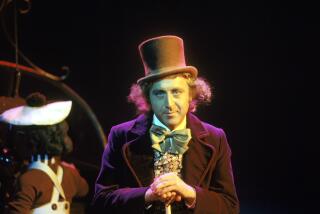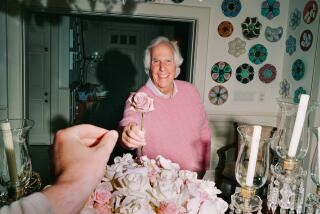Gene Wilder self-portrait reveals the tears of a clown
- Share via
NEW YORK — The story of Gene Wilder’s life is filled with comedy, but ultimately it is not funny. The light stuff is immortalized in the films that turned Wilder into one of the great comic actors of his day -- “The Producers,” “Willy Wonka and the Chocolate Factory” and “Young Frankenstein,” to name a few. The rest of it is pretty dark, and Wilder remembers the day the darkness settled in.
It’s 1941, and Wilder is an 8-year-old named Jerry Silberman, living in Milwaukee. A doctor has come by to check on his mother, who has recently had a heart attack. The doctor spots Jerry, grabs him by the arm, leans in and whispers, “Don’t ever argue with your mother -- you might kill her.”
The doctor is fat and his face is sweating. “Try to make her laugh,” he adds. Then he’s out the door.
For years, Wilder labored under the impression that a few sharp words could mortally wound his mom, and that some well-timed jokes might actually extend her life.
Sound heavy? It gets heavier in “Kiss Me Like a Stranger,” Wilder’s new autobiography, a book as frank and raw as a session with a shrink, filled with blunt musings about sex, acting and the search for love and happiness. There’s plenty of show business in here too, with memorable walk-ons by the stars and directors Wilder collaborated with over the years, including Woody Allen, Mel Brooks and Gilda Radner, the wife he lost to cancer in 1989.
But the book is far more hug-and-ponder than kiss-and-tell. Wilder comes across as a sensitive and damaged man who spent years trying to figure out how to enjoy himself. Through his teen years, any sort of happiness led to excruciating guilt, because his mother, whose heart was impaired as a child by rheumatic fever, was forever in physical pain. One day in March, when he was 18, Wilder was gripped by an obsession that for a time overwhelmed his life: He began to pray compulsively -- sometimes for hours and hours on end.
“My mother was suffering every day of her life and what right did I have to be happy if she was suffering?” Wilder murmurs, sitting in the corner banquette of the dining room at the Carlyle Hotel recently. “So whenever I got happy about something, I felt the need to cut it off, and the only way to cut it off was to pray. ‘Forgive me Lord.’ For what, I didn’t know.”
At 71, he has the relieved and slightly haggard look of a survivor, which in some regards is what he is. Diagnosed with non-Hodgkin’s lymphoma in 1999, Wilder is today in total remission. His eyes still register the wonder and gentleness that were leitmotifs of his years in front of the camera. He still seems on the verge of saying something hysterical.
But he doesn’t. In person, as on the printed page, Wilder is a man of few punch lines. There’s hardly a yuk in “Kiss Me,” and throughout a 45-minute interview, he says nothing intended to amuse. This doesn’t surprise his friends, who describe Wilder as thoughtful, warm and the least shticky of funny men. But the full extent of his mental and emotional struggles is news even to people who have known him for decades.
“I had dinner with him in 1987, right after my own book came out,” says actor and friend Charles Grodin, who met Wilder in the 1950s. “And he told me at the time that he wished my book had gone deeper. I was slightly irritated. I said, ‘That’s as deep as I get.’ Now that his book is out, I see what he means.”
Wilder didn’t focus on the idea of an autobiography until two years ago in California, where his fourth wife, Karen, was nursing her mother back to health. He thought he’d be there a week. The trip lasted more than two months. He started writing in part to ease the boredom, and as he composed, he began to see his life as a series of fortunate accidents.
“When I wrote down those accidents,” he says, “the floodgates opened.”
The first was the visit by that doctor, which in hindsight set off something in his head that eventually, he says, led him to the stage, which eventually led him to the movies.
Until that moment he’d never tried to make his mother, or anyone else, laugh, but after that house call, he did. And when he succeeded, he gained confidence, even as his psyche became more fragile. The Demon, as he calls his compulsion to pray, arrived without warning and left a few years after his mother’s death when he was 23. Her passing freed him up to experience a variety of joys, including sex.
“About a month after my mother died, I bought my first condom,” he says.
He changed his name -- Wilder is from Thornton Wilder, Gene is from a Thomas Wolfe novel -- took classes with Lee Strasberg and married a woman whom he began to dislike on the drive to their honeymoon.
His break came in 1963 when he starred alongside Anne Bancroft in “Mother Courage and Her Children.” Bancroft’s boyfriend, Mel Brooks, thought Wilder would be great for one of the leads in his screenplay, then titled “Springtime for Hitler.” It took several years to raise the money for what would become “The Producers,” now a cult fave and Tony-showered Broadway musical, but a commercial flop then.
Three years later, director Mel Stuart was casting a kids’ movie about a chocolate maker. Fred Astaire and Joel Grey were recommended for the role of Willy Wonka. But Stuart knew he had the man as soon as Wilder read for the part.
“He had been in ‘The Producers,’ but he wasn’t a superstar,” says Stuart. “I looked at him and I knew in my heart there could only be one person who could play Willy Wonka.”
The 1970s were Wilder’s decade. He was in that rarefied place in the business where studio heads let you direct (“The Adventure of Sherlock Holmes’ Smarter Brother”) and pair you in buddy movies (including “Silver Streak” with Richard Pryor). He co-wrote the horror-movie spoof “Young Frankenstein” with Brooks.
Wilder was twice divorced when he met Radner in 1981. Though charming and funny, she comes off as a difficult person in “Kiss Me Like a Stranger.” (The title was her idea, a phrase she thought sounded interesting.) She was needy, deeply insecure and bulimic, but often delightful too. When she later tried to get pregnant, doctors discovered she had ovarian cancer.
“She was sick for a long time,” friend Dom DeLuise says. “When she passed away, no matter what you said to Gene, his face didn’t move. He was just stunned and numb.”
But Wilder recovered, and in 1991, he married the woman he describes as the love of his life. The pair live in Connecticut, in a house Radner bequeathed to him. Movie scripts arrive, but he’s turned down nearly all of them.
“It’s mostly stuff that they think I can make funny,” he says. “I can’t.”
More to Read
Sign up for our Book Club newsletter
Get the latest news, events and more from the Los Angeles Times Book Club, and help us get L.A. reading and talking.
You may occasionally receive promotional content from the Los Angeles Times.










